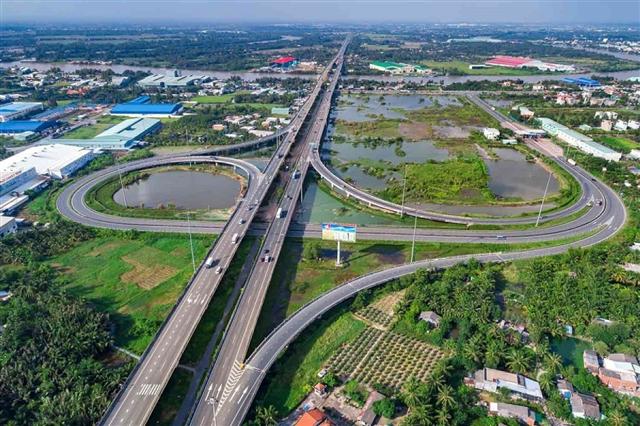New Covid-19 outbreak challenges economic recovery
New Covid-19 outbreak challenges economic recovery
Vietnam’s economy is facing major challenges caused by the new outbreak of Covid-19, and the country is making great efforts to reach its 2021 growth target.
Challenges
In the first quarter of 2021, Vietnam’s economy grew 4.48 percent, lower than the 5.12 percent target set out in Resolution 01/NQ-CP and the 2021 state budget estimates. It is also lower than growths of 6.79 percent, 7.38 percent and 5.1 percent in the same periods of 2019, 2018 and 2017, respectively.

Public investment is being affected by increases in the price of construction materials
|
Many domestic economists and international organizations expect economic growth higher than the 6.5 percent target set by Vietnam’s National Assembly or even seven percent. However, others caution that the forecasts preceded the new outbreak of the pandemic, and the situation has changed since then.
The fourth wave of Covid-19 in Vietnam is more complicated than the first three, as it attacked dozens of provinces and cities nationwide, including crowded production centers such as industrial zones. If the new outbreak is not controlled quickly, it will affect Vietnam’s 2021 growth target.
According to Nguyen Trung Tien, Deputy General Director of the Ministry of Planning and Investment’s General Statistics Office of Vietnam (GSO), prices of raw materials and fuel have increased sharply. The price of iron ore and steel billet, for example, has increased continuously in recent years, affecting construction and public investment. The average price of Brent oil was US$62.3 per barrel in the first five months of this year, up 24.12 percent from December 2020 and up 57.65 percent from the same period last year. Animal feed prices have also tended to increase sharply due to reduced world supply and increased transportation costs. All these have been affecting and will affect Vietnam’s inflation control and economic growth in 2021.
Easing difficulties
The biggest challenge to the country’s growth are the numerous difficulties facing the business sector, which plays a pivotal role in ensuring economic growth and social stability.
In order to achieve the growth target, GSO General Director Nguyen Thi Huong said that the state must adopt additional efficient policies and support packages to help businesses overcome difficulties and ensure production stability. Specifically, it is necessary to continue and expand the current support packages, consider corporate income tax reductions until the end of 2021 for all businesses as well as exemptions and reduction of taxes, fees and land rent until the end of 2021, enable businesses to access credit packages and loans from credit institutions, and provide zero (0) percent or preferential interest rate credit packages for businesses affected by the pandemic.
The government and relevant authorities must also formulate efficient policies to help businesses find customers, expand markets, increase sales, connect with other enterprises, access export information channels, improve production capacity and competitiveness in international trade, and recruit skilled workers, Huong said.
The government considers vaccination acceleration and expansion one of the most important solutions to achieve the country’s 2021 economic growth target. The National Covid-19 Vaccine Fund has just been established to mobilize social resources for the purchase and import of vaccines as well as for research, development and production of domestic vaccines.
| Nguyen Thi Huong, General Director of the Ministry of Planning and Investment’s General Statistics Office of Vietnam (GSO): In order to achieve its growth target, Vietnam needs to take advantage of new-generation free trade agreements, especially the Comprehensive and Progressive Agreement for Trans-Pacific Partnership (CPTPP), the EU-Vietnam Free Trade Agreement (EVFTA), and the Regional Comprehensive Economic Partnership Agreement (RCEP), to boost imports, improve competitiveness and add value to goods. |


























